“I think school is more important for girls than boys,” says Cecilia Abanga with a laugh at her own boldness. “When a girl marries she has to manage a whole lot – being a mother, getting clothes and shopping, cooking, paying school fees.”
Cecilia, 18, is the third of seven (soon to be eight) children born to extremely poor subsistence farmers in Bansi, a remote corner of north-eastern Ghana. She doesn’t plan to marry for 10 years, would like to build her own house in a nearby town and says her best marks are in science. She has yet to master the English taught in all Ghanaian schools so talks to me in her first language, Kusaal, through an interpreter.
Cecilia believes she has a right to education, compulsory in Ghana for two years of nursery plus six of primary or basic school. Theoretically this runs from age four to 12 but, in fact, as many children are late starting and years are repeated when tests are failed, the age range is huge. Three years each of junior and senior high schools completes a Ghanaian schooling.
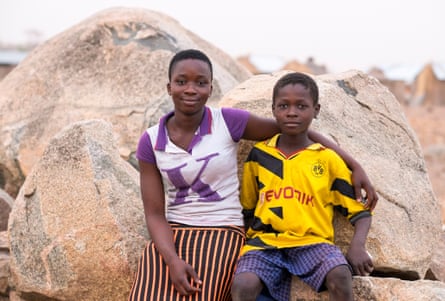
Cecilia enrolled late, she is unsure exactly when, and is in high school every day from 8am until 2pm. She says her parents encourage her to think she can do something with her life other than farming, but do not spend money on her education: “It’s a problem: if you have a fee or need to buy something, you know your parents aren’t going to pay. In the rainy season we earn our own money [as farm labourers] so when bills come we don’t agitate them.”
Though officially free, even basic school brings costs, starting with shoes and uniform (up to 90 cedis or around £15 for bigger children – a significant sum for people lacking any disposable income). Per-head capitation grants from central government can be used to fund free lunches and other extras, but often arrive late so can’t be relied on.
Cecilia’s brother Ayabil is 13 and, in spite of the legal requirement that he goes to school, has never done so. “There’s no money to send him now,” Cecilia says firmly. “I don’t know if he will go when I finish, but for now I know he has to stay here.” Cecilia’s chores of fetching water, cooking and washing up are fitted in at the end of the school day, after which she reads by torchlight in the mud hut she shares with her mother. Villages in this area prone to flooding are not connected to the national grid and have no electricity.
Ayabil’s task of looking after the family’s plot of onions a few minutes’ walk away, across the White Volta river, which is the border with Burkina Faso, stretches out to fill long, dull days of dry-season gardening, mainly weeding and watering with buckets drawn from the river. Aside from jobs like this, sweeping and minding animals, the children say they have nothing to do before rains arrive in a few weeks’ time and farming of staple crops including millet, maize, sorghum and cowpea gets under way.
Ayabil has picked up some knowledge of building and agriculture from his father, but feels lonely, unhappy and jealous about school. “I would like to learn everything, learning is the most important thing,” he says miserably as we talk in the dusk a few metres from the family’s compound on some rocks sticking up from the red scrub strewn with litter. “The kids who go to school have more friends. I know education is a right but no one has enrolled me.” If his parents change their minds, as they tell me afterwards they are thinking of doing, his work, including wading across the river to the onions on the opposite bank, will pass to even younger siblings.
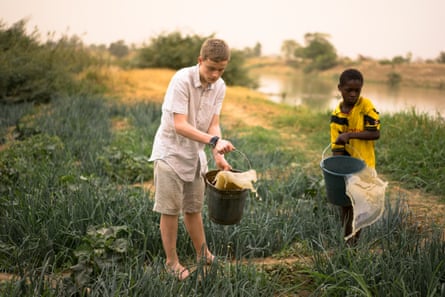
Ayabil has never left the village, and unlike his more worldly big sister doesn’t want to. But the future of farming in this area is uncertain, with soil fertility exhausted, climate-change impacts already being felt, and the costs of fertilisers used to grow the onions heaped on each plot wiping out profits.
“A basic school education makes a difference no matter what enterprise you embark on,” says She Vera Anzagira, a policy officer with ActionAid, which funds education projects here. “As a farmer, being able to read means you can calculate acreage and know what inputs [fertilisers] to use rather than just pouring it on. It helps with healthcare and taking care of your children, and with pricing and selling your produce.”
Two-thirds of Ghana’s 26 million people are farmers, and the west African country is a leader in the priority it has given education since the UN made universal primary schooling one of eight millennium development goals 15 years ago. Ghana spends 8% of GDP on education, more than the UN’s 6% benchmark and more than the UK’s 6.5%. Almost 90% of Ghanaian children are in school – compared with 64% in Nigeria and 72% in Pakistan.
But a few months before the launch of a new set of UN targets, with the goal of universal primary education set to be replaced by a broader focus on lifelong learning, around 440,000 Ghanaian primary-age children (out of 58 million worldwide, 30 million of them in sub-Saharan Africa) are not in school. I am here with the Global Campaign for Education and two British teenagers to find out why.
The short answer is poverty. Though one civil servant we met blamed “cultural” factors for lower levels of enrolment in rural areas, the classrooms of Ninkogo, the local school we visited, were packed, with the youngest in the nursery just two years old and headteacher Musah Mariama Ariatin awaiting completion of a new building that will enable her to split classes of between 100 and 200 children in half.
Barriers to education are higher for some children than others. Teachers say they give those with poor sight or hearing seats at the front, but children with more serious physical or learning disabilities stay at home. Poor sanitation is a problem for menstruating girls, while pregnancy leads some to quit (Ninkogo has one student who returned after having a son, and now brings him with her to nursery). Thomas Baafi, deputy general secretary of Ghana’s main teaching union, says discipline puts some families off, with heated debate over one recent case of an untrained teacher who stood on pupils as a punishment.
Next month Ghana’s supreme court will give its judgment in a case brought by the opposition Progressive People’s party, which wants the government to enforce the law entitling children to free, compulsory education. How this might be done is hard to say. Sanctions against parents are impractical as they generally cannot afford fines, and a social welfare system to support children when carers are imprisoned does not exist. Government, unions and NGOs agree the main problem is lack of resources – classrooms, teachers, toilets, computers, paper – with financial pressures increasing, and the share of funding provided by international donors shrinking each year. None of the 1,200 pupils at Ninkogo had anything other than blackboards at the front of classrooms to write on.
David Archer of the Global Campaign for Education says most developing-world governments are doing better than aid organisations at investing in education, and the 4% of aid money spent on education globally is “shockingly low”. Education is not a quick win, he points out. School takes time.
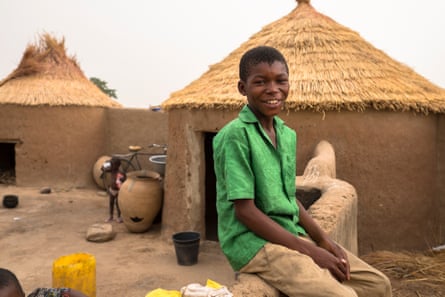
The difference it can make to an individual child’s outlook and prospects could not be better illustrated than in another village we stop at where Lariba Atibilla, out of school and aged 11 or 12 (neither she or her mother is sure), speaks with obvious difficulty due to what seems to be a combination of a shy personality, low self-esteem and sadness or depression following her father’s death more than a year ago. Lariba says her main enjoyment comes from fetching water and washing up, which is more sociable and less degrading than collecting dung for fuel with her mother.
Across the yard, Gabriel Anaba, 14, stands out in his bright green shirt as he watches younger children play ball. He is a hardworking, star pupil, he tells me, who likes to eat rice and stew and wants to be a doctor or a footballer. He laughs as he describes weekends spent gardening as hard and boring, and says: “I feel sorry for children who don’t go to school because they aren’t enlightened and in future they will not be able to get good jobs.” His friend Joseph Alabilla, 15, but in year 5 with mostly 10-year-olds, chips in to say that while his younger classmates make him shy, he hopes to go to university and train as a nurse or teacher.
To get there he will have to go through junior and senior high schools, for children aged 12 to 19, with charges starting at around 10 cedis a year for tests (less than £2) but rising steeply to include registration (around 40 cedis or £8) and boarding fees at rural senior schools.
At Ninkogo’s after-school girls’ club I meet two teenagers, Stella Ayagre and Merci Alale Emmanuel, who tell me they need 1,000 cedis (£175) each if they are to enter senior school this year. Their chances are slim, though they may be able to earn a little by hiring themselves out as porters carrying goods for local traders on their heads. “There isn’t even money at home for food to eat,” says Stella, “there is no way we can pay the fees. We think about it all the time. We are waiting for God to help us.”
Gender equality
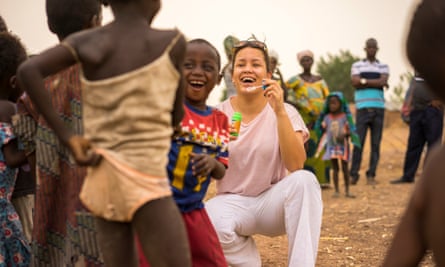
“I think gender equality is almost as good as in UK schools,” says 15-year-old Emily Pemberton of the Send My Friend to School campaign.
Emily, and George Watts, from Welsh-speaking Ysgol Gyfun Plasmawr school in Cardiff, won the Steve Sinnott award established in memory of the former NUT general secretary, to join this trip as young ambassadors. Both campaign on equalities at school, Emily focused on feminism and anti-racism and George on homophobia.
Ghana’s female education minister, Naana Jane Opuku-Agyemang, is a former university vice-chancellor, and the country has a good record in girls’ education, with schools receiving additional funding for female pupils, though problems including sanitation, early pregnancy, sexual harassment and forced marriage remain.
There are equal numbers of girls and boys enrolled in school in Ghana, and the Welsh pair met with girls’ clubs and groups in the rural north-east and in Accra. “We haven’t come and forced it upon them, they’re doing it off their own backs,” says George. Emily adds: “There are still issues – FGM, rape, domestic violence, girls being taken advantage of by their teachers. But from what we’ve seen and the girls we’ve met, I am really impressed.”
Susanna Rustin’s trip was funded by the Global Campaign for Education UK and the National Union of Teachers. Free packs are available to schools at sendmyfriend.org
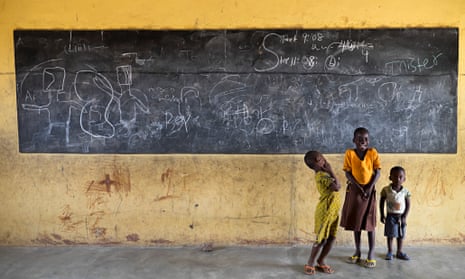
Comments (…)
Sign in or create your Guardian account to join the discussion